200864 Managing Global Business Environment: Comparative Analysis
VerifiedAdded on 2022/08/31
|6
|1292
|14
Report
AI Summary
This report presents a comparative analysis of the global business environment, focusing on Australia and Saudi Arabia. It utilizes Hofstede's cultural framework to compare power distance and individualism, highlighting differences in organizational hierarchies and societal values. The analysis further explores acculturation and modernization theories, examining how cultural adaptation and technological advancements influence each country. The report then delves into the global business environment, comparing economic factors such as growth, employment, and the impact of global events like the financial crisis. It also investigates key industries and the role of foreign investment in both nations. References are provided to support the analysis.
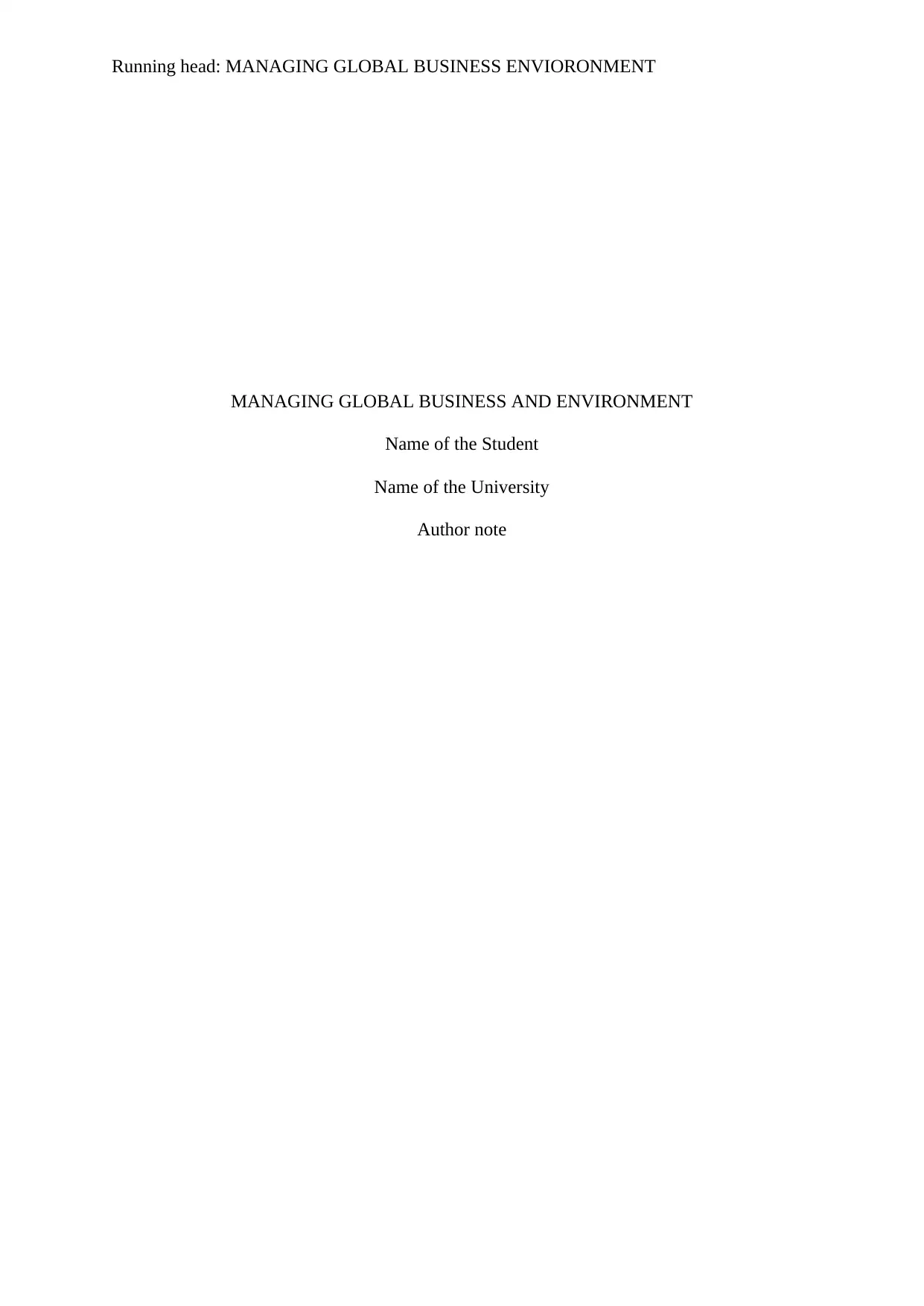
Running head: MANAGING GLOBAL BUSINESS ENVIORONMENT
MANAGING GLOBAL BUSINESS AND ENVIRONMENT
Name of the Student
Name of the University
Author note
MANAGING GLOBAL BUSINESS AND ENVIRONMENT
Name of the Student
Name of the University
Author note
Paraphrase This Document
Need a fresh take? Get an instant paraphrase of this document with our AI Paraphraser
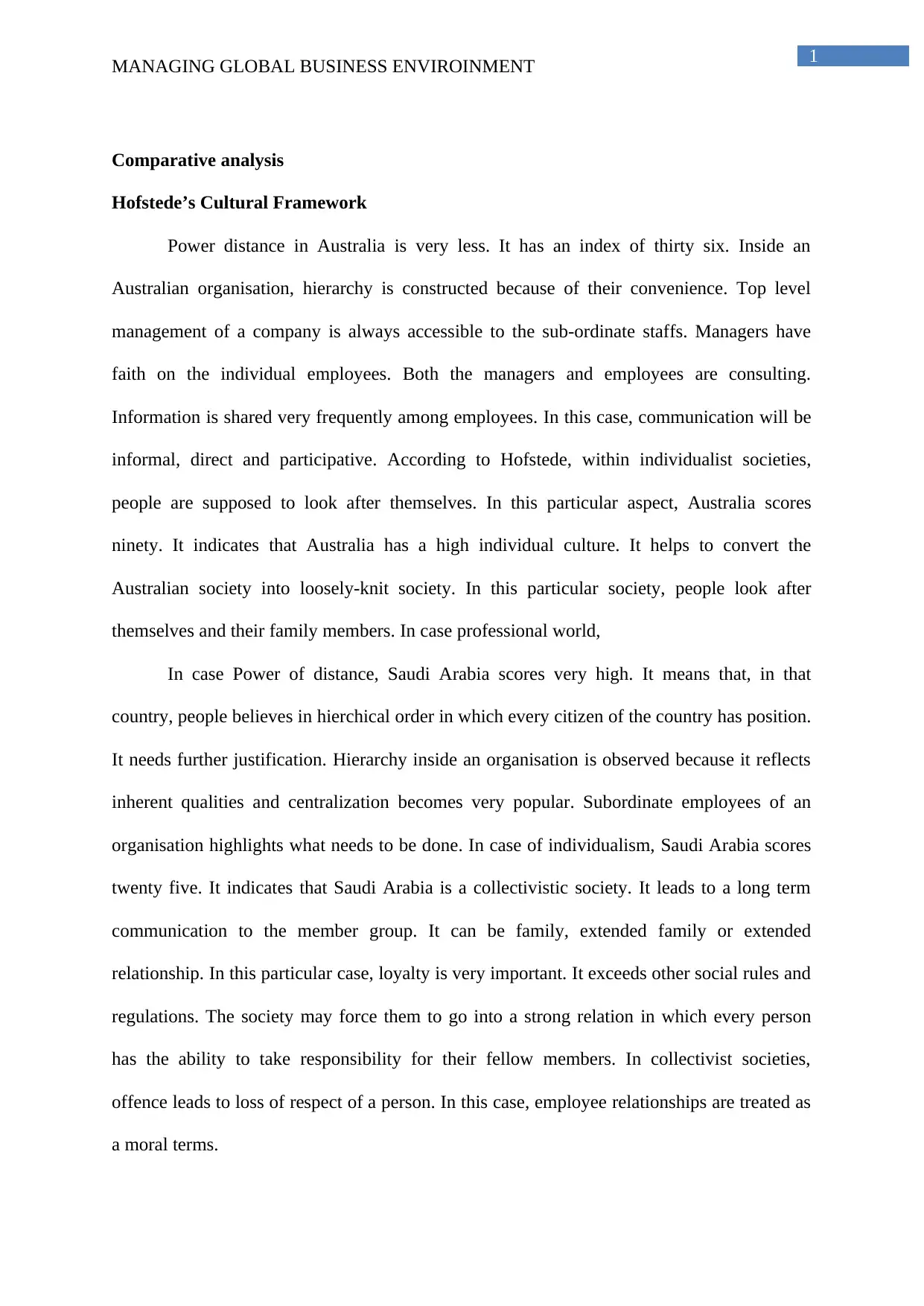
1
MANAGING GLOBAL BUSINESS ENVIROINMENT
Comparative analysis
Hofstede’s Cultural Framework
Power distance in Australia is very less. It has an index of thirty six. Inside an
Australian organisation, hierarchy is constructed because of their convenience. Top level
management of a company is always accessible to the sub-ordinate staffs. Managers have
faith on the individual employees. Both the managers and employees are consulting.
Information is shared very frequently among employees. In this case, communication will be
informal, direct and participative. According to Hofstede, within individualist societies,
people are supposed to look after themselves. In this particular aspect, Australia scores
ninety. It indicates that Australia has a high individual culture. It helps to convert the
Australian society into loosely-knit society. In this particular society, people look after
themselves and their family members. In case professional world,
In case Power of distance, Saudi Arabia scores very high. It means that, in that
country, people believes in hierchical order in which every citizen of the country has position.
It needs further justification. Hierarchy inside an organisation is observed because it reflects
inherent qualities and centralization becomes very popular. Subordinate employees of an
organisation highlights what needs to be done. In case of individualism, Saudi Arabia scores
twenty five. It indicates that Saudi Arabia is a collectivistic society. It leads to a long term
communication to the member group. It can be family, extended family or extended
relationship. In this particular case, loyalty is very important. It exceeds other social rules and
regulations. The society may force them to go into a strong relation in which every person
has the ability to take responsibility for their fellow members. In collectivist societies,
offence leads to loss of respect of a person. In this case, employee relationships are treated as
a moral terms.
MANAGING GLOBAL BUSINESS ENVIROINMENT
Comparative analysis
Hofstede’s Cultural Framework
Power distance in Australia is very less. It has an index of thirty six. Inside an
Australian organisation, hierarchy is constructed because of their convenience. Top level
management of a company is always accessible to the sub-ordinate staffs. Managers have
faith on the individual employees. Both the managers and employees are consulting.
Information is shared very frequently among employees. In this case, communication will be
informal, direct and participative. According to Hofstede, within individualist societies,
people are supposed to look after themselves. In this particular aspect, Australia scores
ninety. It indicates that Australia has a high individual culture. It helps to convert the
Australian society into loosely-knit society. In this particular society, people look after
themselves and their family members. In case professional world,
In case Power of distance, Saudi Arabia scores very high. It means that, in that
country, people believes in hierchical order in which every citizen of the country has position.
It needs further justification. Hierarchy inside an organisation is observed because it reflects
inherent qualities and centralization becomes very popular. Subordinate employees of an
organisation highlights what needs to be done. In case of individualism, Saudi Arabia scores
twenty five. It indicates that Saudi Arabia is a collectivistic society. It leads to a long term
communication to the member group. It can be family, extended family or extended
relationship. In this particular case, loyalty is very important. It exceeds other social rules and
regulations. The society may force them to go into a strong relation in which every person
has the ability to take responsibility for their fellow members. In collectivist societies,
offence leads to loss of respect of a person. In this case, employee relationships are treated as
a moral terms.
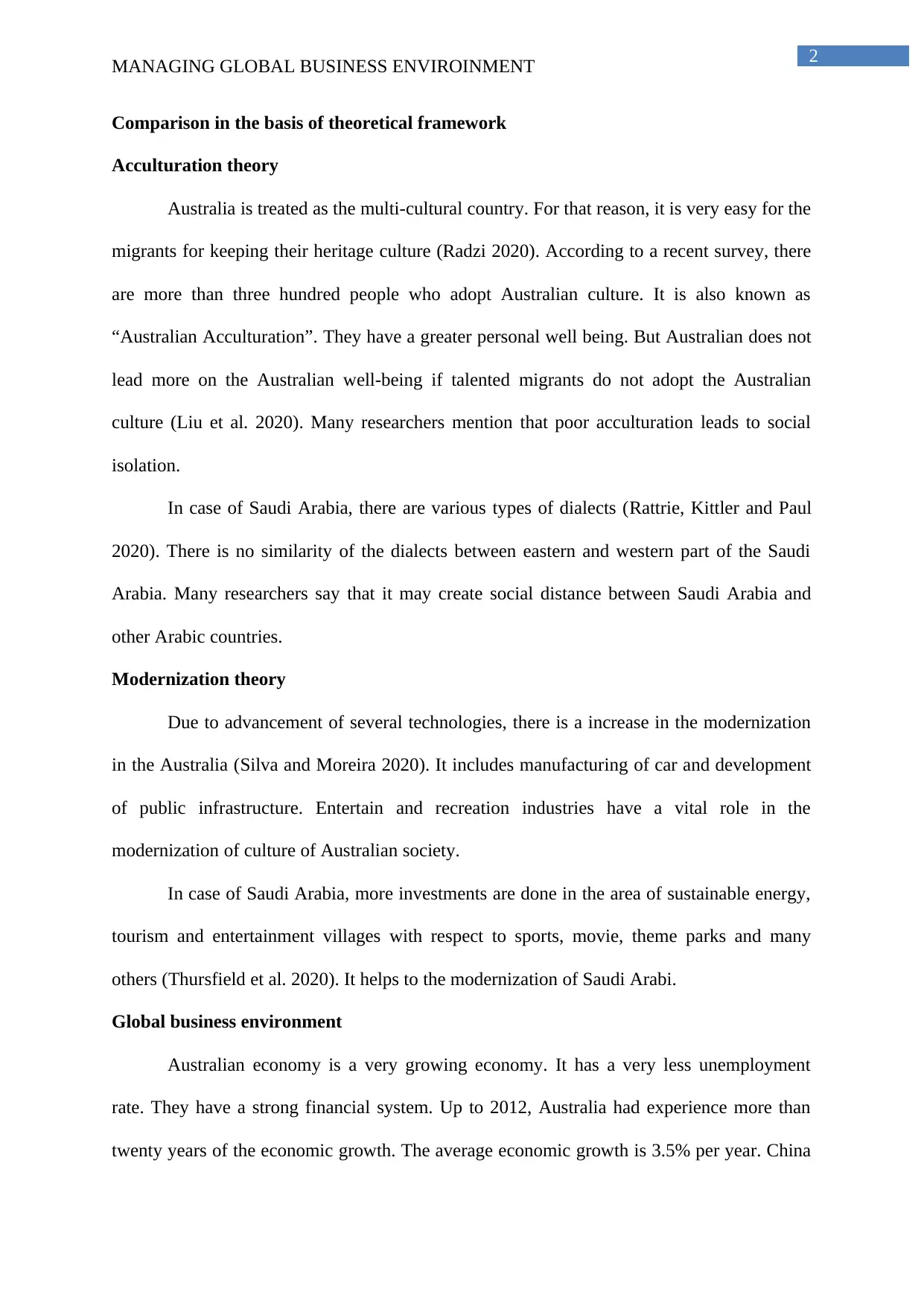
2
MANAGING GLOBAL BUSINESS ENVIROINMENT
Comparison in the basis of theoretical framework
Acculturation theory
Australia is treated as the multi-cultural country. For that reason, it is very easy for the
migrants for keeping their heritage culture (Radzi 2020). According to a recent survey, there
are more than three hundred people who adopt Australian culture. It is also known as
“Australian Acculturation”. They have a greater personal well being. But Australian does not
lead more on the Australian well-being if talented migrants do not adopt the Australian
culture (Liu et al. 2020). Many researchers mention that poor acculturation leads to social
isolation.
In case of Saudi Arabia, there are various types of dialects (Rattrie, Kittler and Paul
2020). There is no similarity of the dialects between eastern and western part of the Saudi
Arabia. Many researchers say that it may create social distance between Saudi Arabia and
other Arabic countries.
Modernization theory
Due to advancement of several technologies, there is a increase in the modernization
in the Australia (Silva and Moreira 2020). It includes manufacturing of car and development
of public infrastructure. Entertain and recreation industries have a vital role in the
modernization of culture of Australian society.
In case of Saudi Arabia, more investments are done in the area of sustainable energy,
tourism and entertainment villages with respect to sports, movie, theme parks and many
others (Thursfield et al. 2020). It helps to the modernization of Saudi Arabi.
Global business environment
Australian economy is a very growing economy. It has a very less unemployment
rate. They have a strong financial system. Up to 2012, Australia had experience more than
twenty years of the economic growth. The average economic growth is 3.5% per year. China
MANAGING GLOBAL BUSINESS ENVIROINMENT
Comparison in the basis of theoretical framework
Acculturation theory
Australia is treated as the multi-cultural country. For that reason, it is very easy for the
migrants for keeping their heritage culture (Radzi 2020). According to a recent survey, there
are more than three hundred people who adopt Australian culture. It is also known as
“Australian Acculturation”. They have a greater personal well being. But Australian does not
lead more on the Australian well-being if talented migrants do not adopt the Australian
culture (Liu et al. 2020). Many researchers mention that poor acculturation leads to social
isolation.
In case of Saudi Arabia, there are various types of dialects (Rattrie, Kittler and Paul
2020). There is no similarity of the dialects between eastern and western part of the Saudi
Arabia. Many researchers say that it may create social distance between Saudi Arabia and
other Arabic countries.
Modernization theory
Due to advancement of several technologies, there is a increase in the modernization
in the Australia (Silva and Moreira 2020). It includes manufacturing of car and development
of public infrastructure. Entertain and recreation industries have a vital role in the
modernization of culture of Australian society.
In case of Saudi Arabia, more investments are done in the area of sustainable energy,
tourism and entertainment villages with respect to sports, movie, theme parks and many
others (Thursfield et al. 2020). It helps to the modernization of Saudi Arabi.
Global business environment
Australian economy is a very growing economy. It has a very less unemployment
rate. They have a strong financial system. Up to 2012, Australia had experience more than
twenty years of the economic growth. The average economic growth is 3.5% per year. China
⊘ This is a preview!⊘
Do you want full access?
Subscribe today to unlock all pages.

Trusted by 1+ million students worldwide
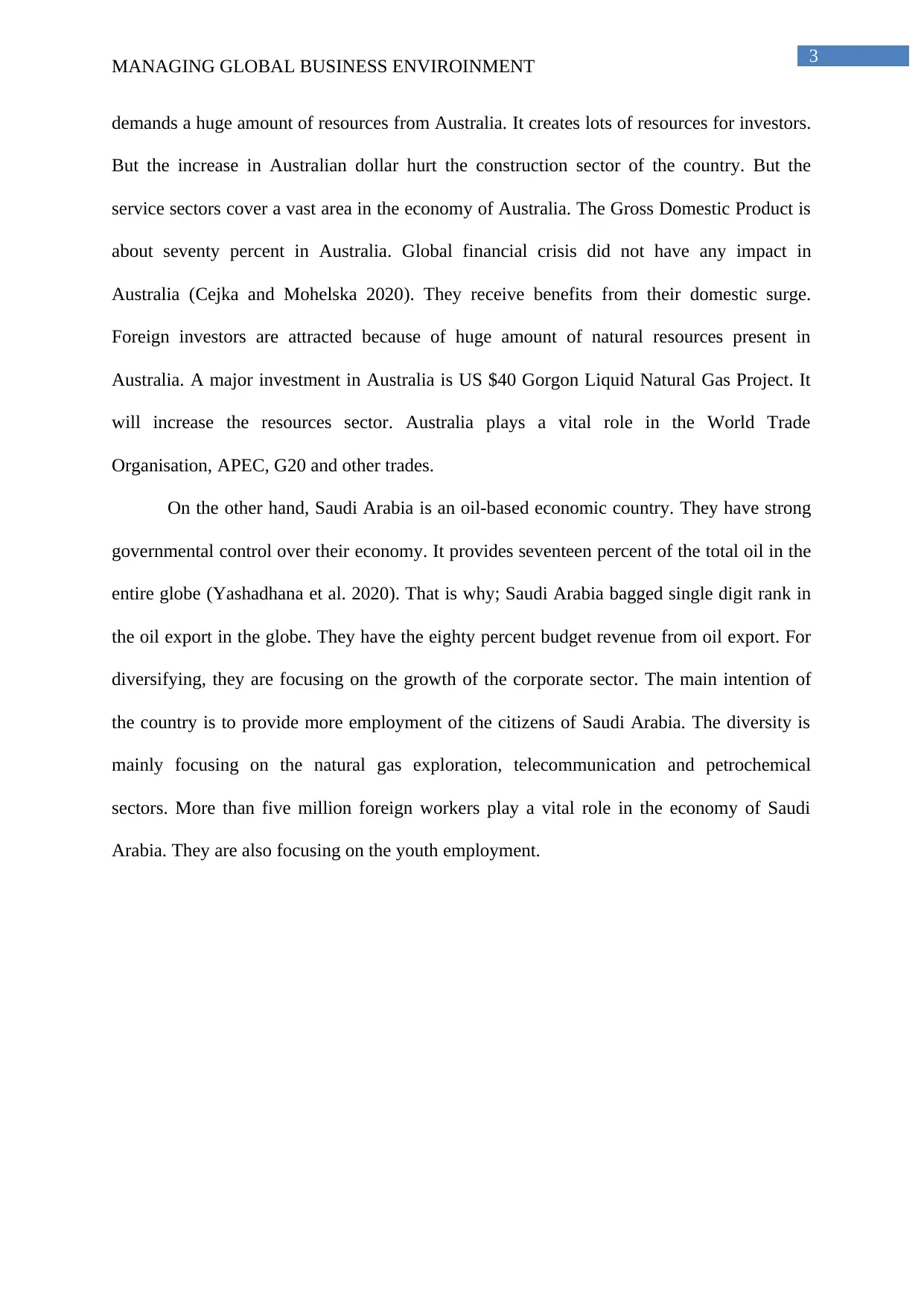
3
MANAGING GLOBAL BUSINESS ENVIROINMENT
demands a huge amount of resources from Australia. It creates lots of resources for investors.
But the increase in Australian dollar hurt the construction sector of the country. But the
service sectors cover a vast area in the economy of Australia. The Gross Domestic Product is
about seventy percent in Australia. Global financial crisis did not have any impact in
Australia (Cejka and Mohelska 2020). They receive benefits from their domestic surge.
Foreign investors are attracted because of huge amount of natural resources present in
Australia. A major investment in Australia is US $40 Gorgon Liquid Natural Gas Project. It
will increase the resources sector. Australia plays a vital role in the World Trade
Organisation, APEC, G20 and other trades.
On the other hand, Saudi Arabia is an oil-based economic country. They have strong
governmental control over their economy. It provides seventeen percent of the total oil in the
entire globe (Yashadhana et al. 2020). That is why; Saudi Arabia bagged single digit rank in
the oil export in the globe. They have the eighty percent budget revenue from oil export. For
diversifying, they are focusing on the growth of the corporate sector. The main intention of
the country is to provide more employment of the citizens of Saudi Arabia. The diversity is
mainly focusing on the natural gas exploration, telecommunication and petrochemical
sectors. More than five million foreign workers play a vital role in the economy of Saudi
Arabia. They are also focusing on the youth employment.
MANAGING GLOBAL BUSINESS ENVIROINMENT
demands a huge amount of resources from Australia. It creates lots of resources for investors.
But the increase in Australian dollar hurt the construction sector of the country. But the
service sectors cover a vast area in the economy of Australia. The Gross Domestic Product is
about seventy percent in Australia. Global financial crisis did not have any impact in
Australia (Cejka and Mohelska 2020). They receive benefits from their domestic surge.
Foreign investors are attracted because of huge amount of natural resources present in
Australia. A major investment in Australia is US $40 Gorgon Liquid Natural Gas Project. It
will increase the resources sector. Australia plays a vital role in the World Trade
Organisation, APEC, G20 and other trades.
On the other hand, Saudi Arabia is an oil-based economic country. They have strong
governmental control over their economy. It provides seventeen percent of the total oil in the
entire globe (Yashadhana et al. 2020). That is why; Saudi Arabia bagged single digit rank in
the oil export in the globe. They have the eighty percent budget revenue from oil export. For
diversifying, they are focusing on the growth of the corporate sector. The main intention of
the country is to provide more employment of the citizens of Saudi Arabia. The diversity is
mainly focusing on the natural gas exploration, telecommunication and petrochemical
sectors. More than five million foreign workers play a vital role in the economy of Saudi
Arabia. They are also focusing on the youth employment.
Paraphrase This Document
Need a fresh take? Get an instant paraphrase of this document with our AI Paraphraser
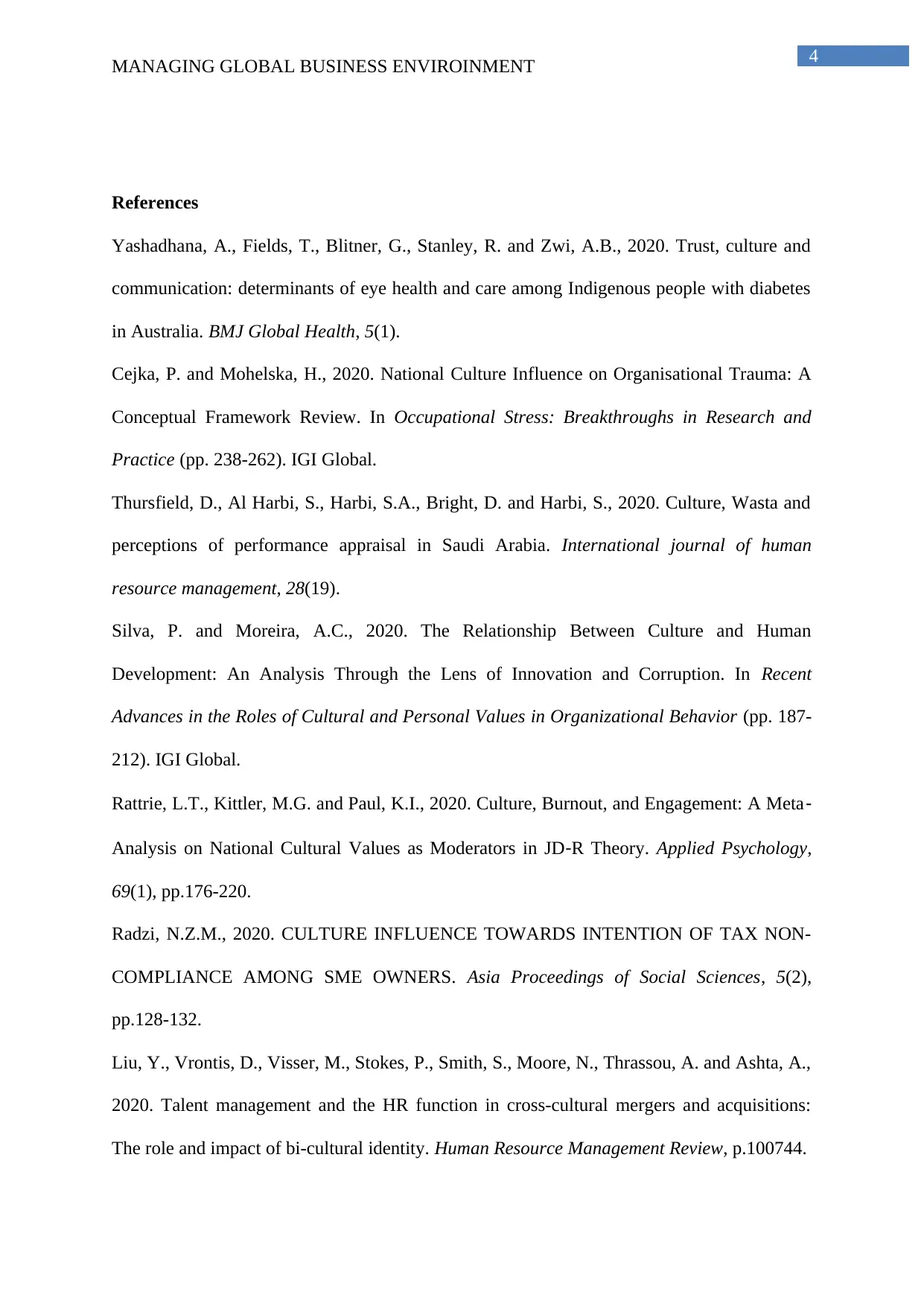
4
MANAGING GLOBAL BUSINESS ENVIROINMENT
References
Yashadhana, A., Fields, T., Blitner, G., Stanley, R. and Zwi, A.B., 2020. Trust, culture and
communication: determinants of eye health and care among Indigenous people with diabetes
in Australia. BMJ Global Health, 5(1).
Cejka, P. and Mohelska, H., 2020. National Culture Influence on Organisational Trauma: A
Conceptual Framework Review. In Occupational Stress: Breakthroughs in Research and
Practice (pp. 238-262). IGI Global.
Thursfield, D., Al Harbi, S., Harbi, S.A., Bright, D. and Harbi, S., 2020. Culture, Wasta and
perceptions of performance appraisal in Saudi Arabia. International journal of human
resource management, 28(19).
Silva, P. and Moreira, A.C., 2020. The Relationship Between Culture and Human
Development: An Analysis Through the Lens of Innovation and Corruption. In Recent
Advances in the Roles of Cultural and Personal Values in Organizational Behavior (pp. 187-
212). IGI Global.
Rattrie, L.T., Kittler, M.G. and Paul, K.I., 2020. Culture, Burnout, and Engagement: A Meta‐
Analysis on National Cultural Values as Moderators in JD‐R Theory. Applied Psychology,
69(1), pp.176-220.
Radzi, N.Z.M., 2020. CULTURE INFLUENCE TOWARDS INTENTION OF TAX NON-
COMPLIANCE AMONG SME OWNERS. Asia Proceedings of Social Sciences, 5(2),
pp.128-132.
Liu, Y., Vrontis, D., Visser, M., Stokes, P., Smith, S., Moore, N., Thrassou, A. and Ashta, A.,
2020. Talent management and the HR function in cross-cultural mergers and acquisitions:
The role and impact of bi-cultural identity. Human Resource Management Review, p.100744.
MANAGING GLOBAL BUSINESS ENVIROINMENT
References
Yashadhana, A., Fields, T., Blitner, G., Stanley, R. and Zwi, A.B., 2020. Trust, culture and
communication: determinants of eye health and care among Indigenous people with diabetes
in Australia. BMJ Global Health, 5(1).
Cejka, P. and Mohelska, H., 2020. National Culture Influence on Organisational Trauma: A
Conceptual Framework Review. In Occupational Stress: Breakthroughs in Research and
Practice (pp. 238-262). IGI Global.
Thursfield, D., Al Harbi, S., Harbi, S.A., Bright, D. and Harbi, S., 2020. Culture, Wasta and
perceptions of performance appraisal in Saudi Arabia. International journal of human
resource management, 28(19).
Silva, P. and Moreira, A.C., 2020. The Relationship Between Culture and Human
Development: An Analysis Through the Lens of Innovation and Corruption. In Recent
Advances in the Roles of Cultural and Personal Values in Organizational Behavior (pp. 187-
212). IGI Global.
Rattrie, L.T., Kittler, M.G. and Paul, K.I., 2020. Culture, Burnout, and Engagement: A Meta‐
Analysis on National Cultural Values as Moderators in JD‐R Theory. Applied Psychology,
69(1), pp.176-220.
Radzi, N.Z.M., 2020. CULTURE INFLUENCE TOWARDS INTENTION OF TAX NON-
COMPLIANCE AMONG SME OWNERS. Asia Proceedings of Social Sciences, 5(2),
pp.128-132.
Liu, Y., Vrontis, D., Visser, M., Stokes, P., Smith, S., Moore, N., Thrassou, A. and Ashta, A.,
2020. Talent management and the HR function in cross-cultural mergers and acquisitions:
The role and impact of bi-cultural identity. Human Resource Management Review, p.100744.
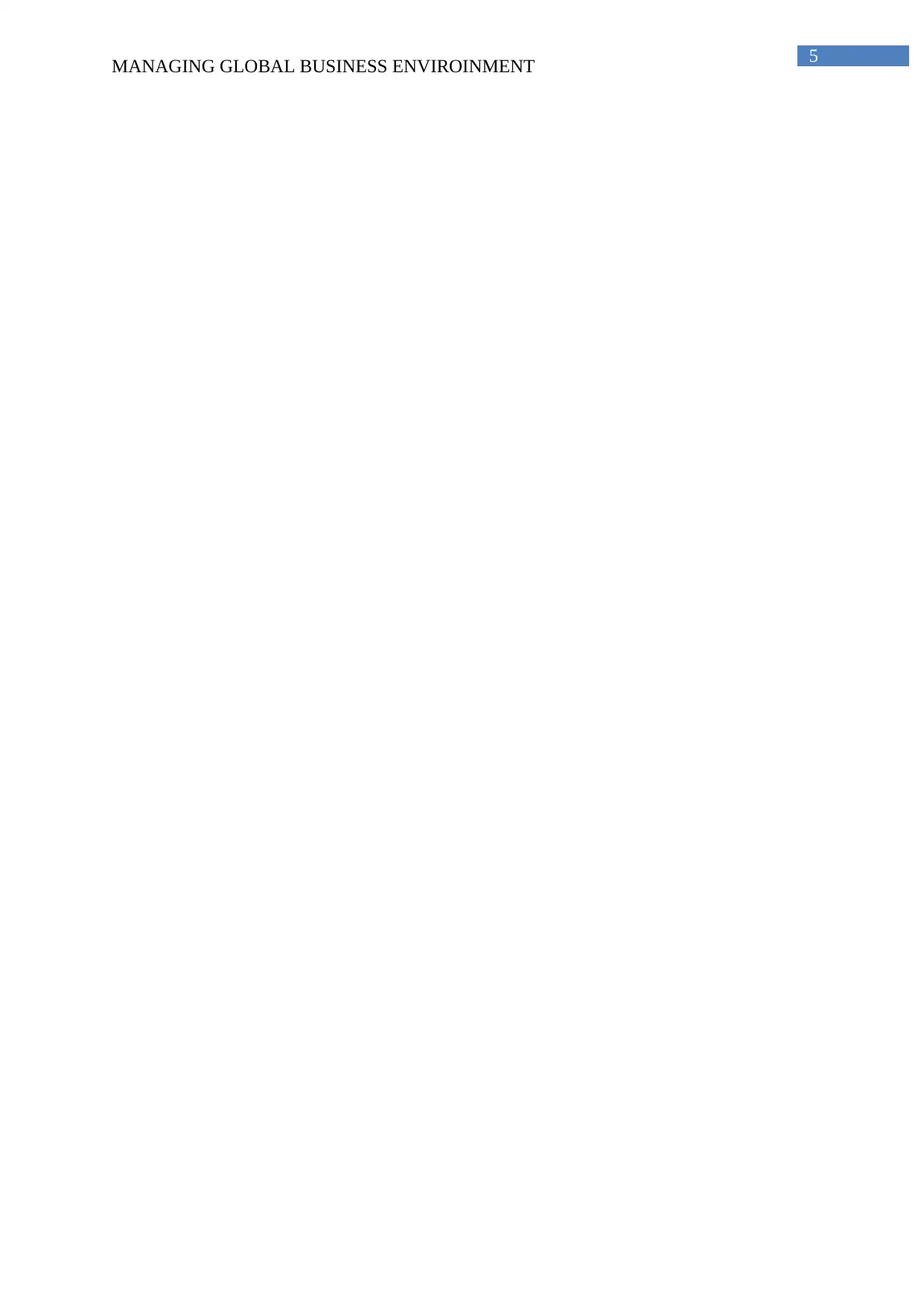
5
MANAGING GLOBAL BUSINESS ENVIROINMENT
MANAGING GLOBAL BUSINESS ENVIROINMENT
⊘ This is a preview!⊘
Do you want full access?
Subscribe today to unlock all pages.

Trusted by 1+ million students worldwide
1 out of 6
Related Documents
Your All-in-One AI-Powered Toolkit for Academic Success.
+13062052269
info@desklib.com
Available 24*7 on WhatsApp / Email
![[object Object]](/_next/static/media/star-bottom.7253800d.svg)
Unlock your academic potential
Copyright © 2020–2026 A2Z Services. All Rights Reserved. Developed and managed by ZUCOL.





